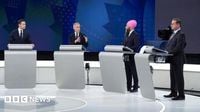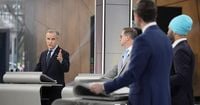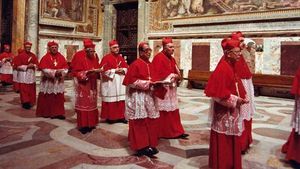In a politically charged atmosphere, the recent federal leaders' debates in Canada have highlighted significant tensions among party leaders, particularly in the context of the upcoming April 28 election. The debates, held on April 16 and 17, 2025, saw Liberal Leader Mark Carney, Conservative Leader Pierre Poilievre, New Democratic Party (NDP) Leader Jagmeet Singh, and Bloc Québécois Leader Yves-François Blanchet engage in heated exchanges over pressing issues such as affordability, security, and the influence of U.S. President Donald Trump on Canada.
During the French-language debate, Carney faced aggressive questioning from his opponents, who sought to capitalize on any perceived weaknesses in his leadership. Poilievre, in particular, accused Carney of being part of the "lost decade" under former Prime Minister Justin Trudeau, stating, "You are just like Justin Trudeau. You are exactly the same, and we need a change." Carney, however, defended his record, emphasizing his experience as the former governor of the Bank of England and his commitment to protecting Canadian interests.
In a moment that encapsulated the tension of the debate, Carney warned Canadians about the threats posed by Trump, asserting, "He's trying to break us so they can own us." This statement resonated with voters concerned about the economic implications of Trump's policies, particularly in light of the ongoing economic crisis attributed to his administration.
The debates also revealed a shift in Poilievre's tone. While he is known for his combative style, he adopted a more measured approach during the English-language debate, refraining from his usual catchphrases. Instead, he focused on personal stories, such as his upbringing by a single mother, to connect with voters facing economic hardships. "Many of you are worried about paying your bills, feeding your families or ever even owning a home," he said, positioning himself as a candidate who understands the struggles of everyday Canadians.
Singh, meanwhile, struck a softer tone in his closing statement, invoking the historical contributions of the NDP to Canadian social policies. He stated, "I am asking for your support in this election so I can continue to fight for the things that make Canada, Canada — the things that we hold dear, the things that make us proud to be Canadian." Singh's remarks were aimed at reinforcing the NDP's commitment to universal healthcare and other social safety nets.
Blanchet, representing the interests of Quebec, emphasized the province's distinct identity and the need for greater autonomy in negotiations with the U.S. He argued, "Let’s be economic partners. Let’s have a voice chosen by and for Quebecers, an ally for Canadians as equals in front of Mr. Trump." His comments reflect the Bloc's focus on ensuring Quebec's interests are prioritized in federal policies, particularly in light of U.S.-Canada relations.
The debates were not without controversy. Tensions escalated in the media room, where journalists expressed frustration over the presence of Rebel News, a right-wing media outlet that dominated post-debate press conferences. NDP leader Singh refused to take questions from Rebel News, accusing the organization of spreading disinformation. The debate commission faced criticism for allowing Rebel News more access than other media outlets, leading to calls for greater transparency and fairness in the electoral process.
In a surprising turn, the debate commission announced the cancellation of post-debate scrums, citing concerns over the environment for journalists. Michel Cormier, the executive director of the Leaders' Debates Commission, stated, "We don’t feel we can guarantee a proper environment," which only added to the frustrations of the media present.
As the campaigns heat up, the leaders are under increasing pressure to articulate clear and actionable plans for addressing the pressing issues facing Canadians. With affordability and the high cost of living dominating discussions, each leader is striving to present themselves as the most viable option for voters looking for change.
The political landscape is further complicated by the exclusion of the Green Party from the debates, a decision that co-leader Jonathan Pedneault condemned as "unjust and undemocratic." The debate commission's rationale for excluding the Greens has sparked discussions around inclusivity and fairness in the electoral process, with many arguing that a true democracy should allow for diverse voices.
As the election approaches, Canadians are left to weigh the promises and policies of the major parties. Polls indicate a tight race, with Carney's Liberals holding a slim lead over Poilievre's Conservatives. According to recent data, Carney's party is at 42.4% support, while Poilievre's Conservatives are close behind at 40.2%. Singh's NDP and Blanchet's Bloc are trailing significantly, with 7.6% and 5.9% respectively.
With the stakes high and the political climate fraught with tension, the upcoming election promises to be a pivotal moment for Canada. Voters will need to navigate the complexities of each party's platform and the implications of their choices on the future of the nation.





